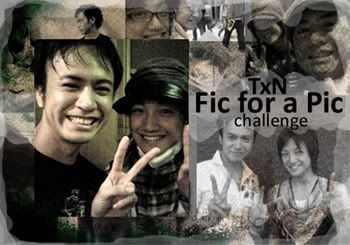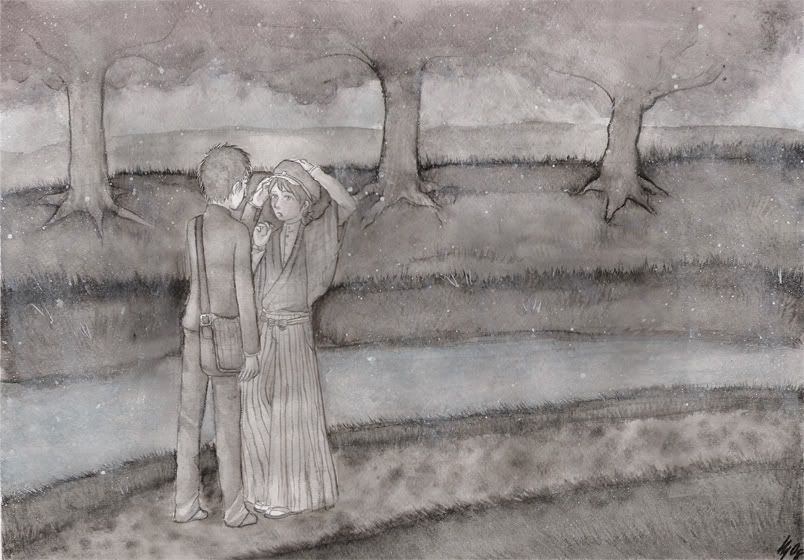Fic for a Pic- AU Historic

er... sorry people, I'm going to have to postpone the deadline (again) because of some extenuating weather circumstances ^__^;; If you're still writing, just get them to me as soon as you can, the challenge will be open until at least this Sunday.
Title: AU Historic
Category: AU Historic
Rating: G
Words: 1,126
Pic:

Nagayama stands at the front of the classroom and bows back at his students as they bow to him, standing in a neat row in front of their benches. As they straighten up, he smiles and nods, and the children let out a small cheer. They wave goodbye to both Nagayama and the little girl who has come to stand next to him, and happily chatter away as they walk out the door.
When they are all gone, Nagayama crouches down and addresses Haruko. “Ready to go home?”
“Hai!” The reply is as sunny as the sky outside. Nagayama smiles again; his niece would be his favourite student even if they weren’t related - she never fails to brighten up his day. He sweeps the classroom with his eyes, making sure that no child carelessly left something behind, before taking Haruko’s hand and leading her out.
He’s about to shut the door behind him when there is a polite cough beside him.
“Excuse me, sensei, but could you tell me where this is?”
There is a man in a peaked cap and a Western uniform next to him, holding out a letter. Clothes like that are rare in this seaside village, where most of the families are involved in the business of fishing. Strangers are even rarer - nobody ever comes here since the fishermen go elsewhere to trade, and the road leads nowhere except the next village. Suddenly shy, Nagayama looks down at the letter in the man’s hand and at the name on it - it is the name of one the young wives of the Daiki brothers who live next door. Hospitality says that he should take care of this stranger, so he says to the man, “I live right next door to that home. I could show you the way, if you like.”
The man touches the peak of his cap and smiles, and Nagayama notices the twinkle in his eye. “That would be very nice.”
The way home would be silent if not for Haruko’s childish prattle. Nagayama wishes the man would stop looking around his village with those strange dark eyes that lurk behind his strange dark hair. He has never travelled outside of his village, though his wandering heart wishes he could. He has never met anybody outside of this village due to this, even though his imagination is full of the people that exist out there. Now that one such person is just beside him, he doesn’t quite know what to think or say.
The village is small, and they are at the Sano family home in a matter of minutes. Sano Mizuki-san’s wife opens the door and accepts the letter, before withdrawing. Back on the street the man bows to Nagayama.
“Thank you very much for your help…”
“Nagayama Takashi.”
He bows. “Thank you very much, Nagayama-san.”
Nagayama bows back. And then, because decorum demands it of him, and because he is curious, he blurts out, “Would you like to come in for a drink?”
The man smiles and looks at where the sun is in the sky. “I think I could spare a while, if it is not too much of a bother.”
Inside, Nagayama puts a pot of water on the fire to boil. He tells Haruko to go to play, and he is left alone with the stranger.
“This is embarrassing,” he says, “But I do not seem to know your name.”
The man has taken his cap off and has set it on the table. His hair seems even more alive than it’d previously seemed, now that it is free of the constraints of the cap. “Ah, I am Tsuchiya Yuuichi. I am the new mailman; I took over from my father, who retired last month.”
Nagayama vaguely remembers the last mailman, who used to come once a month to deliver the few letters that came to the village. All he recalls is a blue uniform - similar to the one that Tsuchiya-san is wearing now, actually - and a broad, leathery face.
“Ahh, I remember him, though I only remember the uniform. Is that the same one?”
Tsuchiya-san laughs, and it is surprisingly hearty. “No, no, my mother made a new one for me. Plus I added a cap.” He fondles it gently with a finger; there is vanity in his touch, but Nagayama sees that it is a vanity born from pride in his job.
The lid on the pot rattles, and he takes it off the fire, washes the tea cups, and makes the tea. As he whisks he says, “It must be an enjoyable job, being a mailman, you get to see the world.”
“Ahh, but it is such small portion of the world, Nagayama-san. I have travelled 50 miles today, but it seems like so few. There is still the rest of Japan , and then there is outside of Japan - I have heard of such things they have, in the other countries. Who knows what else is out there?”
Nagayama pours the tea and presents one cup to his guest. “I have never had the opportunity to leave this place - I am weak and sickly, and so I cannot go to sea and trade in the next village like my father can. I cannot even till the land like my sister, mother and grandmother can. All I can do is teach our children in the schoolhouse.”
“But it is a good job, and an honourable one.” Tsuchiya sips from the cup. “This is good. Thank you.”
“Yes, it is, and the children are kind, and parents are grateful. Yet, I wish I could see what is out there, even just once.” Nagayama sighs wistfully, and takes a sip from his own cup. He holds the base of the cup in the palm of his left hand, and turns it contemplatively with his right; as he stares into his tea, the shadows like his fringe fall across his face, and further softens his feminine features. He looks up and catches Tsuchiya staring, and there is a moment of stunned awkwardness, because the look in Tsuchiya’s eyes is raw and naked in its appraisal, and the look in Nagayama’s own is laid equally bare, but only in surprise.
The polite masks that they have put on for each other in recognition of their mutual strangeness now lie, carelessly dropped, on the floor. But they are not forgotten. Nagayama carefully snatches his up, and he says, “I think you should go.”
And Tsuchiya bends slowly to retrieve his own, and every line in his body speaks regret, but when he straightens, cap back in his hands, there is only a polite smile on his face, and cool, bland eyes saying, “I think I should go.”